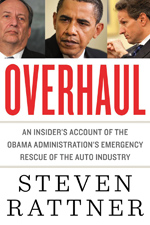Originally appeared in The New York Times.
MEMO to Republican legislators biting your nails over the New York primary, wondering if you can finally derail Donald J. Trump’s candidacy with, gulp, Ted Cruz: You brought it on yourselves.
Not just by failing for too long to take Mr. Trump seriously or by lacking an effective response once you did. That’s well-covered territory. Most important, you created the anger that lifted his candidacy by years of systematically and effectively preventing passage of legislation that might have ameliorated the tough economic state of Mr. Trump’s core voters.
Mr. Trump’s biggest supporters are disproportionately white, middle-aged, working-class men without college educations, a group whose fortunes have flagged as globalization and new technology have rendered millions of jobs obsolete and cut into the wages of many more. While the trade agreements that Mr. Trump bashes have played a role, the mistake was not having entered into them, but having failed to sufficiently help affected workers adjust to the new dynamics.
For too many, those new dynamics have been painful indeed. In Michigan, where Mr. Trump won big, wages in manufacturing have fallen from a high of $28 per hour in 2003 to $21 at present, after adjustment for inflation, a stunning 25 percent decline.
Meanwhile, the number of manufacturing jobs in the state has fallen from almost 900,000 in September 1999 to just under 600,000 at present, a picture that is repeated across the country.
Throughout his presidency, Mr. Obama has put forward constructive proposals to help those displaced workers. For its part, the Republican Congress has been behaving like Nero.
Take, for example, the administration’s 2011 proposal of a $447 billion package of measures including payroll tax cuts and the creation of an infrastructure bank that would have led to the creation of thousands of construction jobs, as well as other substantial economic benefits.
Designed to be bipartisan and fully paid for by higher taxes on rich Americans and some corporations, the American Jobs Act was nonetheless dead virtually upon its arrival on Capitol Hill.
That’s not all. During his administration, Mr. Obama put forth proposals for larger tax credits for child care; community college investments; expansion of the earned-income tax credit; changing retirement plans to be portable across employers and available to part-time workers; and tax credits for manufacturing communities.
All these — and many more — were ignored by Congress. Even seemingly obvious steps, like continuing federal emergency benefits for the large number of long-term unemployed, have been blocked. Since the passage of the Affordable Care Act, 19 states — mostly with Republican governors — have declined Mr. Obama’s Medicaid expansion plan.
In its most recent budget, the White House put forth a robust plan for wage insurance, a concept with much support among economists. Under it, a worker who lost his or her job and was forced to take a lower-wage one that paid less than $50,000 per year would receive half of the lost wages for two years, up to $10,000.
Like many of Mr. Obama’s proposals, that wouldn’t be a game changer for working-class Americans, but it would have been a constructive piece of a more comprehensive solution.
The Republican congressional leadership has refused to even hold hearings on the Obama budget.
To be sure, Mr. Obama was successful in achieving passage of some of his initiatives last year, such as making permanent the earned-income tax credit, the child tax credit and modest assistance for older Americans adversely affected by trade. And Mr. Obama deserves substantial credit for the drop in joblessness on his watch.
But that’s not sufficient progress. For one thing, Mr. Trump’s support tends to be concentrated in areas with low labor force participation. For another, with real wages declining for many Americans, the enactment of relatively minor initiatives is small beer.
Whoever wins the Republican nomination, it’s too late to address the concerns of Mr. Trump’s core constituents before November. The anger felt by so many will not be eased until Washington takes affirmative steps.
To ease the immediate pain, we need a much stronger safety net: extended unemployment benefits for the long-term unemployed, wage insurance, a higher minimum wage and the like. Cutting our irrational austerity frenzy to step up investment in infrastructure is a no-brainer. All of this can — and should — be paid for by higher taxes on the wealthy.
Mr. Trump may have succeeded in directing the anger of his supporters toward Washington in general and President Obama in particular. But Republicans should take heed: Given your shutdown of legislation that would help downtrodden Americans, their anger should really be focused on you.





